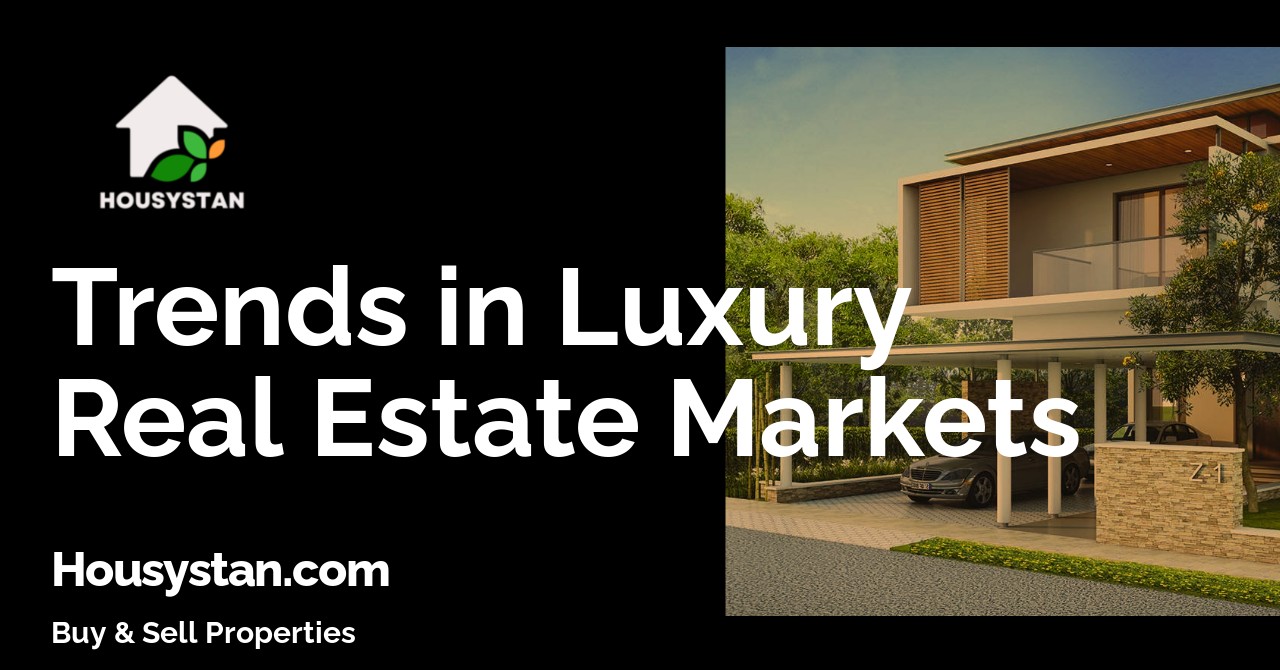Trends in Luxury Real Estate Markets
Read latest blogs and articles from Housystan

The Information mentioned here was last updated on:
29/1/2026Exploring Trends in Luxury Real Estate Markets: What Buyers Need to Know
The luxury real estate market is a dynamic landscape that offers incredible opportunities and significant challenges. While the COVID-19 pandemic reshaped many aspects of the real estate sector, the demand for luxury homes has shown remarkable resilience and adaptability. This blog post delves into the prevailing trends in luxury real estate markets, helping potential buyers and industry enthusiasts understand the current environment.
1. Urban Exodus: The Shift to Suburban and Rural Areas
- Verified Tenants/Buyers
- Unlimited Property Listing
- Zero subscription/charges fee
The pandemic spurred a noticeable shift in home-buying preferences. Affluent buyers, previously confined to bustling city centers, are now exploring the outskirts and less densely populated areas for their luxury home purchases.
- Space and Comfort: As remote work became the norm, buyers prioritized larger properties with home offices, gyms, and ample outdoor space. Suburban and rural areas offer these amenities at a fraction of the cost compared to urban centers.
- Nature and Privacy: Many buyers are looking for properties that provide an escape from crowded city life. Homes with scenic views, private gardens, and proximity to nature trails are highly sought after.
2. Tech-Savvy Homes: The Rise of Smart Luxury
Technology plays an increasingly critical role in the luxury real estate market. Modern buyers demand homes equipped with the latest smart technology that enhances convenience and security.
- Smart Home Features: Integrated smart systems allowing homeowners to control lighting, temperature, and security via their smartphones are now a standard expectation.
- Sustainability and Efficiency: Energy-efficient appliances and sustainable building materials are more popular than ever, aligning luxury living with eco-conscious values.
3. Exclusive Amenities: Beyond Standard Luxury
While luxury homes have long been synonymous with opulence, today's buyers are looking for unique amenities that set their properties apart.
- Wellness Facilities: Homes with private spas, yoga studios, and state-of-the-art gyms cater to buyers placing a premium on health and well-being.
- Entertainment Spaces: High-end buyers desire spaces that offer unparalleled entertainment options, such as dedicated home theaters, wine cellars, and even music studios.
4. Global Investment: The Appeal of International Luxury Markets
Investors know that diversifying their portfolio with international properties can yield significant returns. Several key trends highlight the increasing globalization of the luxury real estate market.
- Emerging Markets: Cities such as Dubai, Bangkok, and Lisbon are attracting international buyers due to their favorable investment climates and luxurious property offerings.
- Cultural and Lifestyle Appeal: Prestigious locations offering rich cultural experiences, excellent cuisines, and favorable climates are at the top of luxury buyers' lists.
5. Virtual Reality: The Future of Home Buying
The use of technology in real estate transactions has soared, particularly during times of restricted movement and social distancing.
- Virtual Tours: Many real estate agents now provide immersive virtual tours, allowing buyers to explore properties in detail from the comfort of their homes.
- Augmented Reality: This technology enables buyers to visualize potential renovations or furnishing changes, making it easier to personalize a purchase before finalizing a deal.
6. Financial Strategies: Innovative Approaches to Luxury Purchases
The financial landscape of luxury real estate is evolving, with buyers exploring new ways to finance their purchases.
- Fractional Ownership: This model allows buyers to own a share of a luxury property, thus making high-end real estate more accessible and reducing overall financial commitment.
- Alternative Investments: Cryptocurrencies and blockchain technologies are emerging as innovative methods for executing high-value real estate transactions, offering both anonymity and security.
7. Environmental Impact: The Growing Demand for Green Luxury Homes
The emphasis on sustainability has penetrated the luxury market, with affluent buyers actively seeking eco-friendly homes.
- LEED Certifications: Properties with Leadership in Energy and Environmental Design (LEED) certifications are highly desirable, as they ensure meeting high environmental standards.
- Green Architecture: Sustainable architecture that blends seamlessly with the natural environment is increasingly popular among luxury buyers. Features like solar panels, green roofs, and rainwater harvesting systems highlight a commitment to eco-friendly living.
8. Interest Rate Influences: How Market Trends Affect Luxury Buyers
Interest rates play a crucial role in shaping real estate market dynamics, with luxury homes being no exception.
- Current Rate Environment: Lower interest rates have made financing large purchases more attractive, fueling the boom in luxury home sales.
- Market Predictions: Stay informed about potential interest rate changes, as these could impact mortgage affordability for high-value properties.
9. Urban vs. Remote: Balancing Preferences and Investments
Buyers are increasingly open to exploring both urban and remote property offerings, resulting in a balancing act of preferences and investments.
- City Center Demand: Despite the exodus to suburbs, certain cities continue to show strong demand due to their cultural significance, economic vitality, and historical charm.
- Remote Property Appeal: Properties in remote areas offer exclusivity and serenity, highly coveted by those seeking a quiet retreat away from the urban hustle.
10. The Role of Real Estate Agents: Navigating the Luxury Market
Expert guidance remains indispensable in navigating the complexities of the luxury real estate market.
- Specialized Knowledge: Real estate agents specializing in luxury properties provide invaluable market insights, helping buyers make informed decisions.
- Negotiation Skills: Experienced agents negotiate favorable terms and ensure a smooth transaction process, from viewing to closure.
The luxury real estate market is continuously transforming, shaped by shifting buyer preferences, technological advancements, and global economic factors. Staying updated with current trends and understanding market dynamics can help both buyers and investors make strategic decisions when purchasing high-end properties. As the landscape evolves, the ability to adapt and embrace change will remain critical for success in the luxury real estate sector.